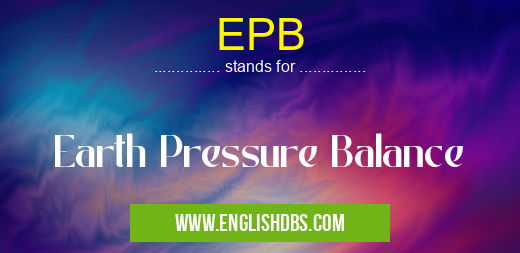What does EPB mean in UNCLASSIFIED
EPB (Earth Pressure Balance) is a type of tunnel boring machine (TBM) used to excavate tunnels in soft to medium-hard ground conditions. EPB TBMs are notable for their ability to control the earth pressure at the excavation face, enabling them to operate in unstable and water-bearing ground without causing ground subsidence or other surface disturbances.

EPB meaning in Unclassified in Miscellaneous
EPB mostly used in an acronym Unclassified in Category Miscellaneous that means Earth Pressure Balance
Shorthand: EPB,
Full Form: Earth Pressure Balance
For more information of "Earth Pressure Balance", see the section below.
EPB System
The EPB system consists of a rotating cutting head, a screw conveyor, and a conditioning chamber. As the cutting head excavates the ground, the excavated soil is mixed with a foaming agent or bentonite slurry to form a soil-foam or soil-bentonite paste. This paste is then transported by the screw conveyor to the conditioning chamber, where it is further conditioned and pressurized to control the earth pressure at the excavation face.
Advantages of EPB TBMs
- Reduced ground disturbance: EPB TBMs minimize ground subsidence and surface disturbances, making them suitable for use in urban areas and sensitive environments.
- Stable excavation: The controlled earth pressure ensures stable excavation, reducing the risk of tunnel collapse or ground instability.
- Water-bearing ground: EPB TBMs can operate in water-bearing ground without causing water ingress or groundwater contamination.
- High penetration rates: The conditioning process reduces friction and improves the excavation efficiency, resulting in higher penetration rates.
- Versatile: EPB TBMs can be used in a wide range of ground conditions, from soft clay to medium-hard rock.
Essential Questions and Answers on Earth Pressure Balance in "MISCELLANEOUS»UNFILED"
What is Earth Pressure Balance (EPB)?
Earth Pressure Balance (EPB) is a tunnel boring technique that involves maintaining the balance between the pressure exerted by the surrounding soil and the pressure applied by the tunnel boring machine (TBM). This balance prevents soil collapse or excessive ground movement during excavation.
How does EPB work?
The EPB TBM has a closed cutterhead that encloses the excavated soil. The soil is transported to a pressurization chamber, where it is mixed with a conditioning agent (e.g., bentonite) to create a viscous slurry. The slurry is then pumped back into the excavation chamber to form a hydrostatic head and balance the earth pressure.
What are the advantages of EPB?
EPB offers several advantages, including:
- Reduced ground disturbance and surface settlement
- Ability to excavate in soft or unstable soils
- Reduced water inflow and ground loss
- Improved safety due to controlled pressure environment
What types of projects is EPB suitable for?
EPB is particularly suitable for projects involving:
- Urban tunneling in congested areas
- Tunneling through soft or water-bearing soils
- Construction of tunnels with small cross-sections or complex geometry
How does EPB compare to other tunneling methods?
Compared to other methods like the Shield or Jet Grouting methods, EPB provides a more controlled and stable excavation environment, reducing the risk of soil collapse or ground movement. It also allows for greater flexibility in tunneling through difficult soil conditions.
Final Words: EPB TBMs are highly efficient and versatile machines that enable the construction of tunnels in challenging ground conditions. Their ability to control earth pressure and minimize ground disturbance makes them an excellent choice for projects in urban areas and sensitive environments. The EPB system has revolutionized tunnel construction, allowing for safe and efficient excavation in a wide range of geological conditions.
